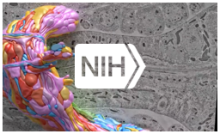
The National Academy of Sciences recently recognized Drs. Liqun Luo, Xiaowei Zhuang, and Eve Marder for their extraordinary scientific achievements. The awards will be presented on April 28, 2019, during the Academy’s 156th annual meeting.
The National Academy of Sciences recently announced their 2019 award recipients, who will be honored on April 28, 2019, at the Academy’s 156th annual meeting. Among the 2019 recipients are Drs. Liqun Luo and Xiaowei Zhuang, two BRAIN-funded researchers, as well as Dr. Eve Marder, an at-large member of the Multi-Council Working Group.
Dr. Liqun Luo (Stanford University) will receive the 2019 Pradel Research Award, which recognizes mid-career neuroscientists whose work is making major contributions to our understanding of the nervous system. The award is presented with a $50,000 research award to designate to an institution of the recipient’s choice to support neuroscience research. Dr. Luo has invented cutting-edge techniques that enable us to better understand how neural circuits in the brain assemble and how they are organized to allow information processing. His BRAIN award uses recently-developed viral-genetic tools to dissect the complexities of the serotonin system into specific sub-systems, in order to elucidate how serotonin modulates diverse physiological functions and behaviors.
Dr. Xiaowei Zhuang (Harvard University) will receive the 2019 NAS Award for Scientific Discovery, which recognizes an accomplishment or discovery in basic research that is expected to have a significant impact on the field. The award is presented with a medal, a $50,000 prize, and $50,000 to support the recipient’s research. Dr. Zhuang is a leader in super-resolution imaging, single-molecule imaging, and genomic-scale imaging; her techniques have shed light on the molecular mechanisms of cellular function. Her BRAIN award is a collaborative effort that uses Mutiplexed Error Robust Fluorescent in situ Hybridization (MERFISH) to create a spatially informed cellular inventory of neural circuits in the mouse.
Dr. Eve Marder (Brandeis University) will receive the 2019 NAS Award in the Neurosciences, which recognizes extraordinary contributions to the progress of the neuroscience fields and is presented with a $25,000 prize. Dr. Marder’s work has focused on understanding neuronal circuits and plasticity through modulators within the crustacean stomatogastric ganglion system, and her transformative work has revealed neural microcircuits to be flexible and dynamic, balancing needs for plasticity and stability. Throughout her career, she has mentored young neuroscientists and championed their voices. Dr. Marder has served for the last two years as an at-large member of the BRAIN Multi-Council Working Group, which provides ongoing oversight of the long-term scientific vision of the BRAIN Initiative. She previously served on the National Advisory Neurological Disorders and Stroke (NANDS) Council from 2011 to 2014, advising the Institute on policy and procedures affecting extramural research programs, as well as providing a second level of review for applications considered by the Institute for funding.
